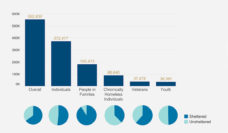In the United States, the Covid-19-driven economic recession hit in the midst of an affordable housing crisis and increased the threat of mass evictions and housing displacement for many renter households. While many other countries adopted legal, economic, and social safety nets to support low and middle-income people who were negatively affected by business closures and shelter-in-place orders, support measures taken in the U.S. were, at best, haphazard. As a result, extreme increases in unemployment and wage loss exacerbated financial hardship among low-income and predominantly minority communities, who were already economically marginalized and experiencing high levels of Covid-19 infection and death. Together, these factors have created an extreme eviction and housing crisis.
State and federal actors adopted a patchwork of eviction moratoria as a pandemic mitigation strategy. When these critical interventions were challenged in court, we partnered with Yale and Wake Forest University law school clinics to submit amici briefs with the goal of ensuring the courts had access to the empirical research demonstrating the importance of these moratoria to the control of respiratory disease. Our article, Eviction, Health Inequity, and the Spread of COVID-19: Housing Policy as a Primary Pandemic Mitigation Strategy, draws from the evidence presented to courts and examines the relationship between housing insecurity and Covid-19 transmission, infection, and mortality, especially among Black populations, who have the highest risk of eviction.
Eviction and housing displacement threatens both individual health and pandemic control efforts. Eviction immediately leads to overcrowding, doubling up, homelessness, and transience. It increases contact with others and hinders compliance with containment measures including social distancing, self-quarantining, and hand hygiene. Indeed, recent studies suggest that the absence or lifting of moratoria adopted to prevent eviction during the pandemic are associated with increased rates of Covid-19 infection and death. In the long-term, eviction results in severe and lasting health and economic impacts that can alter the life course and are likely to hamper pandemic recovery, especially in the historically marginalized communities experiencing the greatest harm.
The people most likely to be evicted are likely to have comorbidities that place them at high risk for Covid-19 infection and death.
Historic trends and recent data demonstrate that people of color are more likely to face eviction and associated comorbidities. Throughout the pandemic, Black people have had less confidence in their ability to pay rent, and landlords have filed evictions against Black and Hispanic people at higher rates than any other group. Black people are dying at two times the rate of non-Hispanic whites. Indigenous Americans and Hispanic/Latinx people face an infection rate almost three times that of non-Hispanic whites.
At the same time, the people most likely to be evicted are likely to have comorbidities that place them at high risk for Covid-19 infection and death. Disproportionate rates of both Covid-19 and eviction in communities of color only compound negative health effects and make eviction prevention a critical intervention to address racial health inequity.
The Covid-19 pandemic magnified the connection between housing, health, and social inequity and underscores the urgency of eviction prevention. Robust eviction moratoria that freeze all parts of the eviction process and apply to all evictions and all renters are critical emergency measures to control the spread of Covid-19 and associated harms. When moratoria are combined with supportive legal and financial measures, such as rental assistance, pre-filing eviction diversion programs, and civil right to counsel, states and localities are better able to prevent eviction and the resulting harms.
The relationship between eviction and health equity will remain long after the pandemic’s conclusion. Beyond pandemic stop-gap measures, it is critical to harness this period of political creativity to address the root causes of the affordable housing and eviction crises, including the effects of discriminatory housing laws and policies, in addition to immediate needs. Only then will health equity and health justice be secured.
Photo via Getty Images

















